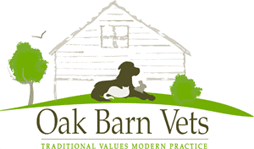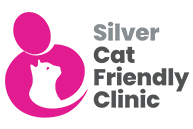So it's Friday 13th! Unlucky for some... Here is our December blog "Christmas Hazards." We have been seeing a fair few cases of pets eating things they shouldn't, so have written a piece to highlight some potential Festive hazards in the home.
As we all start to get into the Festive spirit and all the fun it brings, it's worth giving a little thought for our pets.
As we put up the Christmas tree, decorate the house with decorations, stock our cupboards with yummy tempting food, wrap and place all the presents under the tree remember to think about your pets. All this change in their homes can cause anxiety and bring along some potential hazards too!
Emergency calls to vets increase by approximately 40% over the festive season. Some of these calls are due to our pets chewing or eating some of these things.
Here is a list of potential dangers that could ruin your pets Christmas, starting with food related hazards. To us the list below looks amazing and we can’t wait to have a tummy full of food. But for our pets, all these foods have the potential to cause problems!
Christmas pudding and mince pies.
Both Christmas pudding and Mince pies contain raisins, currants and sultanas. These are toxic. They are part of the grape family and even in small quantities can lead to Kidney failure. If you think your pet has eaten some, we would advise you seek veterinary advice.
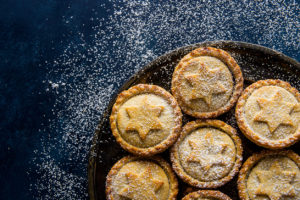
Chocolate.
Chocolate contains a substance called theobromine, it is toxic to both cats and dogs. The severity of the toxicity depends on the type of chocolate eaten and the amount. Clinical signs are normally seen with in 24 hours. They include – tremors, convulsions, drinking more and increased excitability. If you pet does eat chocolate it is important to seek veterinary advice ASAP. If you can tell us what type of chocolate has been eaten along with when and how much, the Veterinary team can determine the best course of action. So, with Christmas around the corner our advice would be to not leave chocolate under the tree, in the tree or anywhere where you pet can get to it.
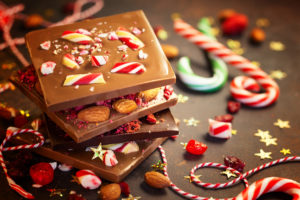
Cooked bones.
It isn’t recommended to feed your pet cooked bones, no matter how tempting they may look. Cooked bones splinter into shards that can cause choking, serious damage to the dog’s mouth, throat or intestines. There are many bone alternatives that would make a much safer Christmas present for your beloved pet!
Onions, garlic, leeks, shallots and chives .
All these foods belong to the Allium species of plant and are toxic to our pets. They can cause vomiting and diarrhoea at first, but their main affect is damage to red blood cells, resulting in anaemia. It is always advised to seek veterinary advice if you are worried that your pet may have eaten any of the above.
Artificial sweeteners.
We all think we are being good not having sugar, but did you know that artificial sweeteners contain xylitol. This is found in chewing gum, toothpaste, as well as a lot of treat we have around Christmas. It is poisonous to dogs. It can induce the release of Insulin by the body. This can cause low blood sugar and sometimes liver damage. Signs of poisoning can be seen quickly or delayed, they include vomiting, lethargy, convulsions and comas. The outcome can be positive is treated quickly.
Mouldy foods.
Mouldy food, if found and eaten by your pet can cause some bother. Please make sure all leftovers from the festive period are disposed of well and kept out of reach of your four-legged friends. Mould from products such as cheese, bread and yoghurt can produce toxins that when eaten can cause a rapid onset of convulsions in dogs. A risk not worth taking.
Alcohol.
Alcohol can have similar effects on dogs as it does their human! They can become wobbly and drowsy and in severe cases there is a risk of low body temperature, low blood sugar and coma. Dogs don’t go looking for a beer or glass of wine but if left unattended they may help themselves. So always ensure alcohol is kept out of reach.
Macadamia nuts.
We all know the bowl of nuts that comes out in most homes at Christmas. Macadamia nuts can cause lethargy, increased body temperature, tremor, lameness and stiffness in dogs.
As we move away from food hazards, we are now looking at decorations and their hazards –
Christmas Tree.
Now we all love a Christmas tree, the smell, the feature in the room, along with the excitement of the presents underneath. If you have a real tree in your house it is worth knowing that if eaten the pine needles that the tree drops can cause a mild stomach upset. We advise to not let your pet eat them, the pine needles also have a sharp point which can cause damage internally.
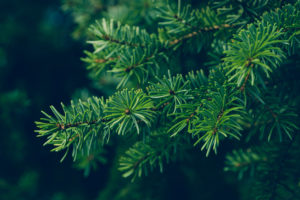
Tinsel.
Tinsel I hear you say, well yes it may not be poisonous to our pets, but it is still dangerous if your pet eats any. The tinsel can wrap itself around your pet's tongue or get stuck in the stomach, causing a blockage. It can cause serious and sometimes fatal damage to the intestinal tract. Signs of a blockage can range from nothing to vomiting, diarrhoea, lethargy, loss of appetite and pain in abdomen. If you suspect your pet has eaten some tinsel, please always seek veterinary advice.
Salt dough ornaments.
This is quite a popular craft with young families. There is nothing nicer than having you own decorations made with love by your children. Be sure to hang them high up out of reach on your Christmas tree away from your pet's reach. The giveaway is in the name – they are made with a large amount of salt, this can make them a hazard to pets. The smell and appearance can make them appealing to our four-legged friends! Too much salt is dangerous for dogs and sodium toxicosis, as it’s known, can occur when dogs eat a salt dough ornament or from drinking too much sea water. If you are worried that your dog may have eaten some salt dough it is important to seek advice asap.
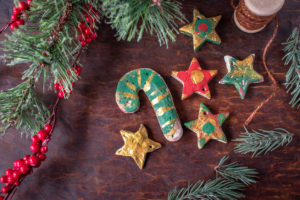
Fairy lights.
Cats are very curious and will try to chew on anything. This can lead to them being burnt or electrocuted. Indoor house rabbits like to chew things too, so we advise it's best to keep pets away from loose wires at Christmas.
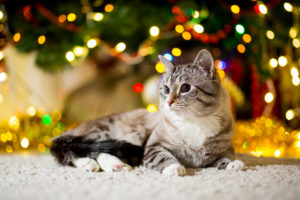
Glass Baubles.
Whether it is your kitten, cat, puppy or dog playing with glass baubles it can be dangerous. To them it’s a great chew until they try to bite it, or it falls off the tree and smashes. Something to consider when decorating the tree!
During the festive period it isn’t just the Christmas tree that comes into the home. We also have many other Indoor plants too.
Mistletoe, Poinsettia and Ivy.
All are poisonous to pets. If ingested they can all cause gastrointestinal upsets. Always keep these plants out of your pets reach.
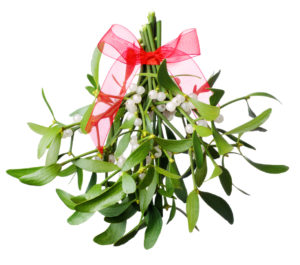
Lilies as beautiful as they are, they are also toxic to cats and dogs.
Finally Presents.
It's that amazing toy that makes a noise under the tree in the house, at least that’s what your dog might think. Some pets show no interest in presents under the tree, whereas others think it’s the best thing ever. Be conscious of what you have under your tree and for how long. It might smell nice, which makes your pet want to investigate be it a toy, food item or dog treats. After the main event has happened be careful with small parts or pieces of toys might be on the floor and your pet may decide to have a chew. It’s amazing what can cause an intestinal blockage!
Also take care with those batteries, nearly all children’s toys need batteries and sometimes these come in the toy, a grandparent may have taped them to the box, or they might be lying around for that just in case needed moment. If you suspect your pet has eaten a battery, then veterinary treatment is needed.
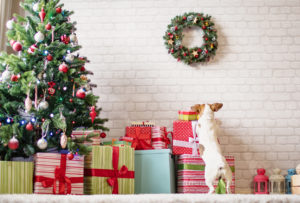
All hazards aside the festive period is an exciting one for young, old and those with four legs! We wish you all a Very Merry Christmas and a Happy New Year!
